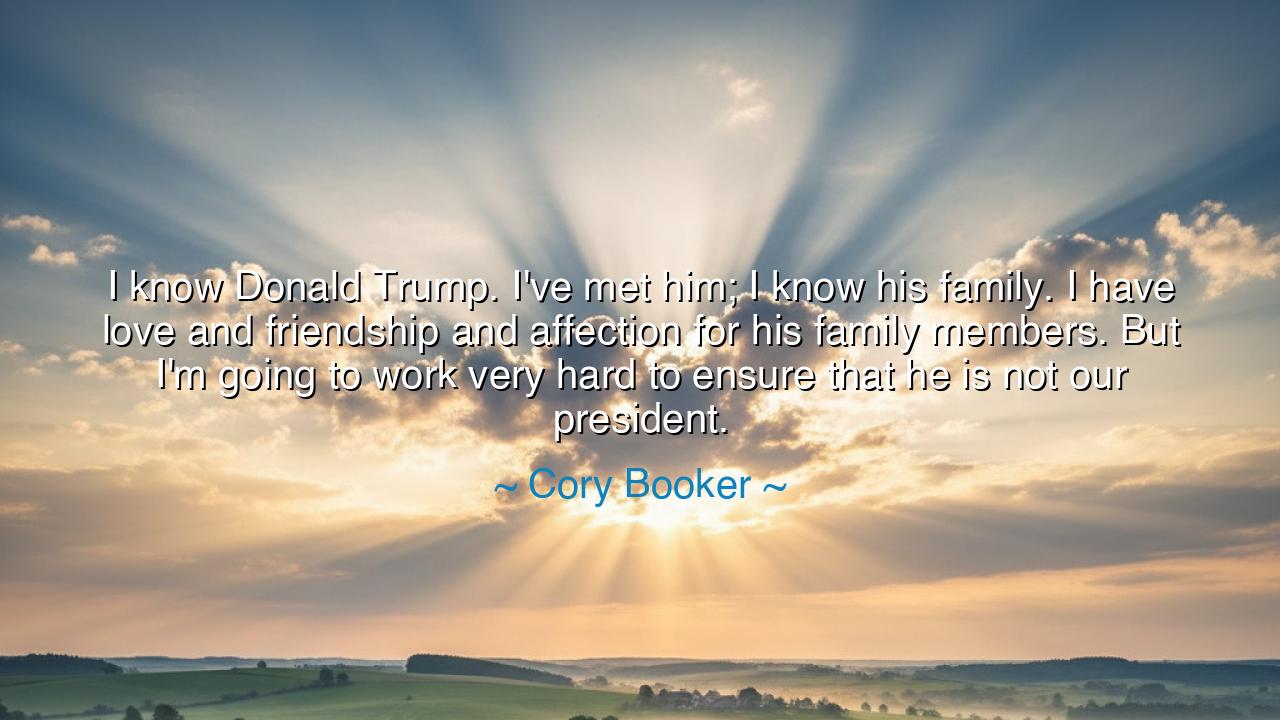
I know Donald Trump. I've met him; I know his family. I have love
I know Donald Trump. I've met him; I know his family. I have love and friendship and affection for his family members. But I'm going to work very hard to ensure that he is not our president.






In the depths of human life, few bonds are as sacred and complex as the tension between friendship and principle. Cory Booker, in his declaration, reflects on this delicate balance when he says: "I know Donald Trump. I've met him; I know his family. I have love and friendship and affection for his family members. But I'm going to work very hard to ensure that he is not our president." These words reveal a fundamental truth—that while friendship and affection may exist between individuals, the choices we make in the realm of public duty and principle often require us to set aside personal relationships for the greater good. It is a reminder that personal connection must sometimes yield to the higher calling of justice and moral integrity.
In the ancient world, the relationship between friendship and duty was not merely a philosophical concept, but a guiding force that shaped the actions of statesmen and warriors. Cicero, the great Roman orator, often spoke of the tension between personal loyalty and the duty owed to the public good. He famously wrestled with the question of how to remain true to his friendships while also maintaining his duty to the Republic. In one of his most celebrated works, On Friendship, Cicero writes about how true friends act in accordance with virtue and the common good. Booker’s stance mirrors this ancient wisdom—while he acknowledges his love and friendship for Trump and his family, he recognizes that his allegiance must lie with the values that promote justice, fairness, and democracy.
The Greeks also understood the complex relationship between friendship and moral duty. Consider the bond between Socrates and his followers. Socrates maintained deep friendships with those who revered his wisdom, but when the time came to stand against the prevailing political forces of Athens, he did not hesitate to choose his duty to the truth over his personal relationships. His decision to face trial and death rather than compromise his principles is one of the most powerful examples of how friendship and moral duty must sometimes be held in balance, with the greater allegiance being to virtue and honor. Booker’s determination to ensure that Trump does not become president, despite his personal feelings of affection for the man’s family, reflects this ancient ideal—standing firm on principle even when it means confronting someone you personally care for.
Throughout history, there have been countless examples where friendship and duty have collided, forcing individuals to make difficult choices. The story of Brutus and Caesar is one of the most poignant in this regard. Brutus, a trusted friend of Julius Caesar, was faced with the agonizing decision of whether to align with his loyalty to Caesar or with the Republic, which he believed was being undermined by Caesar’s growing power. In the end, Brutus chose duty to the Republic over his personal bond with Caesar, and the consequences of that decision were monumental. Similarly, Booker’s words illustrate that friendship, while powerful, must sometimes give way to the higher responsibility of protecting democracy and ensuring the well-being of society at large.
Booker’s commitment to working against Trump’s presidency speaks to a higher principle—one of responsibility to the greater good. Ancient Romans understood that leadership was not about personal gain or friendship, but about serving the common good. Marcus Aurelius, the Stoic emperor, constantly reminded himself that his duty was to the empire, not to personal desires or relationships. His philosophy of duty was rooted in the belief that the leader’s role was to work for the well-being of the many, even when that required personal sacrifice. Booker follows in this tradition, recognizing that while he can hold personal affection for those he cares about, his duty is to the larger ideals of justice, fairness, and progress.
The lesson to be learned from Booker’s words is profound. It teaches us that in our own lives, we too may face moments when friendship and duty collide. Whether in politics, family, or community, we must understand that there are times when we must choose the greater good over personal loyalty. The ancients teach us that virtue and moral integrity are the highest callings, and that true friendship is not merely about mutual affection, but about supporting each other in pursuing what is right. Sometimes, this requires uncomfortable choices, but it is in these moments that our character is truly tested.
In our own lives, let us take this wisdom to heart. Booker’s example teaches us to evaluate relationships not just through the lens of emotion but through the lens of principle and moral responsibility. When we are called to act in the face of injustice or inequality, we must remember that the friendship we value does not require us to compromise our values. Like the ancients, we must learn to balance personal affection with the higher duty to serve the greater good—to uphold what is just, even when it challenges the bonds we share with those closest to us. In doing so, we contribute to building a world rooted in honor, integrity, and the shared pursuit of virtue.






AAdministratorAdministrator
Welcome, honored guests. Please leave a comment, we will respond soon